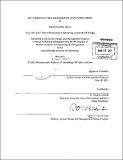The dynamics of circular migration in Southern Europe
Author(s)
Marañón-Abreu, Rafael
DownloadFull printable version (22.67Mb)
Alternative title
Dynamics of circular migration in Southern Europe : an example of social innovation
Other Contributors
System Design and Management Program.
Advisor
Ricardo Valerdi.
Terms of use
Metadata
Show full item recordAbstract
During economic crises, governments establish policies that facilitate the creation of jobs, goods and services that make their economies more resilient. Often this requires innovative social programs that match global migratory trends to local labor demand. The implementation of such programs requires a significant degree of innovation that requires models that can capture the complexity involved. To explore this phenomenon, we provide a multi-disciplinary view of innovative social programs that shed light on the dynamic characteristics of the political, social, technological and economic aspects of circular migration. Our focus is a case study of the European Union-funded circular migration program to support the strawberry harvest in the province of Huelva in Spain. Covering the time period of 2002-2011, this thesis provides a system dynamics model to represent the key elements that led to the success of circular migration from the standpoint of economic and labor supply management. The model helps explain the essential factors that make the program robust not only under recent economic crisis conditions but also under policy constraints. Based on a qualitative analytical approach, the model demonstrates how adaptive policies can enable macroeconomic equilibrium in environments where circular migration can be implemented. We also show that circular migration is not an impediment to economic recovery; in fact, it helps stabilize the labor supply in times of high uncertainty.
Description
Thesis (S.M. in Engineering and Management)--Massachusetts Institute of Technology, Engineering Systems Division, System Design and Management Program, 2011. Cataloged from PDF version of thesis. Includes bibliographical references (p. 95-101).
Date issued
2011Department
System Design and Management Program.; Massachusetts Institute of Technology. Engineering Systems DivisionPublisher
Massachusetts Institute of Technology
Keywords
Engineering Systems Division., System Design and Management Program.